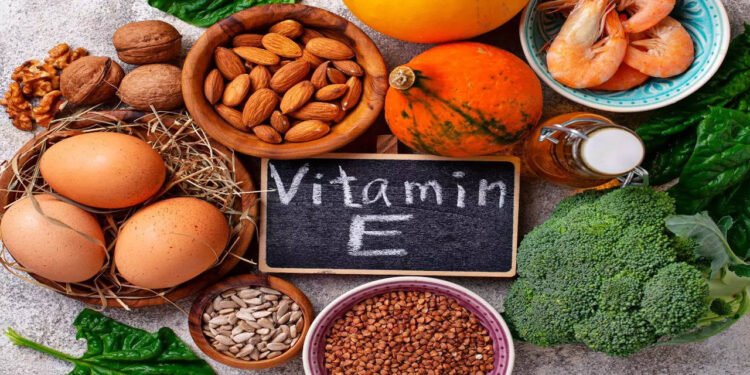Vitamin E is an essential component in our bodies. It works as an antioxidant, shielding our cells from damage.
Consider it a shield that protects your cells from dangerous molecules known as free radicals, which can cause a variety of health problems.
Why is Vitamin E Important?
- Cell Protection: Vitamin E protects cells by combating free radicals. This protection may lower the risk of health issues such as heart disease and cancer.By fighting off free radicals, vitamin E helps prevent cell damage. This protection can reduce the risk of health problems like heart disease and cancer.
- Boosts Immunity: Vitamin E strengthens your immune system, making it easier for your body to fight off infections and illnesses. A strong immune system is essential for staying healthy and warding off diseases.
- Skin Health: Vitamin E boosts your immune system, allowing your body to battle infections and illnesses more effectively. A strong immune system is vital for maintaining health and preventing disease.
- Eye Health: Vitamin E plays a crucial role in maintaining eye health. It can help prevent age-related eye disorders, ensuring your vision remains sharp as you age.
Sources of Vitamin E
You can get vitamin E from various foods. Here are some excellent sources:
- Nuts and Seeds: Almonds, sunflower seeds, and hazelnuts are packed with vitamin E. These make great snacks or can be added to your meals.
- Vegetable Oils: Sunflower oil, safflower oil, and wheat germ oil are rich in vitamin E. Using these oils in your cooking can help you get your daily dose.
- Green Leafy Vegetables: Spinach, broccoli, and Swiss chard are good sources of vitamin E. Including these vegetables in your diet not only boosts your vitamin E intake but also provides other essential nutrients.
- Fruits: Avocados and mangoes also provide a good amount of vitamin E. They can be enjoyed on their own or added to salads and smoothies.
How Much Do You Need?
Vitamin E requirements vary according on age and gender. On average, adults require approximately 15 milligrams (mg) each day.
A well-balanced diet usually suffices to meet this requirement. However, it is critical to ensure that you consume enough to maintain good health.
Signs of Vitamin E Deficiency
While rare, a deficiency in vitamin E can cause problems. Some signs include:
- Weak Muscles: Vitamin E helps maintain muscle strength, so a lack of it can cause muscle weakness. This can make it harder to perform daily activities and exercises.
- Vision Problems: Since vitamin E is essential for eye health, a deficiency can affect your vision. You might experience issues like blurred vision or trouble seeing in low light.
- Immune Issues: A weakened immune system can lead to more frequent infections and illnesses. If you’re getting sick more often than usual, it might be a sign that you’re not getting enough vitamin E.
Tips for Getting Enough Vitamin E
- Eat a Balanced Diet: Include a variety of vitamin E-rich foods in your meals. Aim to eat nuts, seeds, vegetable oils, green leafy vegetables, and fruits regularly.
- Choose Healthy Fats: Incorporate nuts, seeds, and vegetable oils into your diet. These foods are not only rich in vitamin E but also provide healthy fats that are good for your heart.
- Consider Supplements: If you have trouble getting enough vitamin E from food, talk to your doctor about taking a supplement. This can be especially important if you have certain medical conditions or dietary restrictions.
ALSO READ: All You Need to Know About Fish: Types, Nutrients, and Health Benefits
To summarize, Vitamin E is essential for general health. It defends your cells, strengthens your immune system, and maintains your skin and eyes healthy.
A well-balanced diet rich in nuts, seeds, vegetable oils, green leafy vegetables, and fruits will guarantee that you obtain enough of this crucial component.
Remember, a healthy body begins with proper diet. Take care of yourself by incorporating vitamin E-rich foods into your diet, and get the advantages of improved health and well-being!












